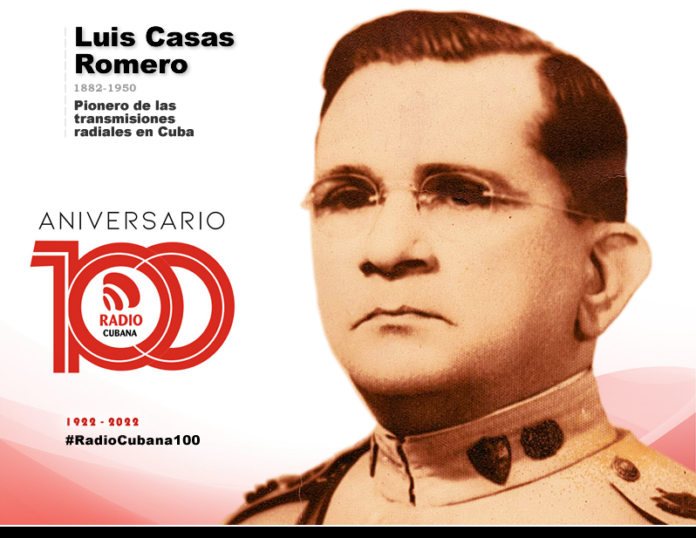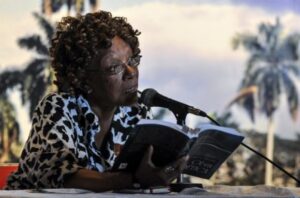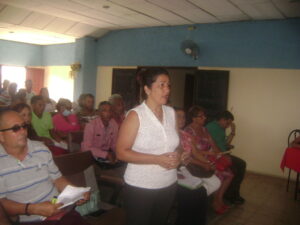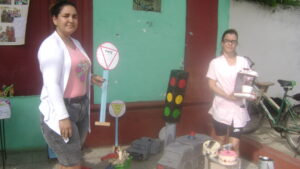It is said that it was with a toy bugle that it all began, that Luis Casas Romero used to give the call and after capturing the nine o’clock cannon shot from San Carlos de la Cabaña, he would say into the microphone: «It’s nine o’clock sharp». It was not just the time, it was an incantation to dream. Then came the weather forecast, and then his daughter Zoila Casas used to present a song and narrate a brief children’s story.
It was a toy cornet, yes; but composer, flutist and bandleader Luis Casas Romero and his family did not play. From their home at Ánimas 99, the first regular broadcasts of Cuban radio took to the airwaves. It is not that there were no illustrious precedents -such as the case of Manolín Álvarez in Caibarién-, but the 2LC became a symbol of a new era a hundred years ago.
Many deaths have been decreed to it, but radio is a continuous reborn. It is nobody’s little sister, its stature is proven. It is a collective way of making art and consequently forges unbreakable bonds. Radio refocuses attention: it is not distracted by ages, faces, dresses, gestures. This medullar character often teaches real lessons.
When I mention that word, «radio», a miracle happens. Time uncrosses the roads and a boy in a blue and white uniform appears, with the red ring of his neckerchief in the center of his chest.
That child that I know closely, knew that when the program «Por nuestros campos y ciudades» was playing, he had to go to the bathroom, and then, at the stroke of noon, when Radio Progreso announced «Alegrías de sobremesa», he had to be ready for lunch, without stopping at the plate: the radio had already put the joy. Minutes later, I was on my way to school. And there I went – still floating in the air – with the stories created by the magician Alberto Luberta.
In the middle of my adolescence, the announcer José Armando Guzmán Cabrales, later National Radio Award winner, moved to my neighborhood. I would stop in front of his house just to listen to him. Needless to say when one day he asked me for poetry for the mythical program «Sunday at eleven» of CMKC radio station… and I saw my small verses flaming in his giant voice.
There is a lot of lineage in the radio people
The radio appeared to me, it appeared without asking permission, it followed me… but I never thought that the radio would be my destiny. Destiny pushes. One day in 1991, I crossed the Plaza de la Revolución Antonio Maceo -the sun at its zenith- and went from the Sierra Maestra newspaper to Radio Siboney. I arrived at the small Santiago radio house, the cultural radio station, without looking back.
And the radio, generous as it is, opened its doors to me. Over time, I have been lucky, very lucky, that other radio stations in the territory and the country have trusted me. Trust is always an act of love. There is a lot of lineage in radio people.
I have had to report, premiere, fire, interview, criticize, clarify, chronicle, unveil, write and above all listen. Learning to listen. Choosing the words with the exact inflection, entering the alchemy of editing, burning with live transmissions, directing a production, saying what needs to be said… can make you bleed.
Forgive me for speaking from up close, it’s always what one knows most intimately. I remember a program that narrated the precise moment when Rodrigo de Triana gave that desperate, euphoric, saving cry from the main mast of La Pinta, when, after two months of voyage, he sighted an island in the Bahamas… but how to embroider the atmosphere of that transcendental moment in the history of the world? how could the announcer-actress become a sailor? How to make it credible?
And there I saw her, Kenia María González, go to the back of the booth, lean against the wall, place her hands next to her lips, take a breath, sigh, go up and give the voice of ….¡TIERRRAAAA….!
I have that scream in my memory, that and the epic music that was filling everything. A listener called us and said he had seen the waves, the coast, the new world.
Radio is unbeatable
And the radio, as we all know, is the big screen. Take away the evocative capacity of sound and the color of a voice. Take away the testimony and the memory. Take away the music and the imagination. Take away the faithful people who love it… and you will have shipwrecked not only radio itself, but part of the most valuable part of our being as a nation.
The paralyzing of a country with the radio soap opera «El derecho de nacer» (The right to be born), Chibás’s knock, José Antonio Echeverría’s interrupted speech, the half century of «Alegrías de Sobremesa», are milestones of Cuban radio. I only mention a few, very few, as a sample.
Radio is the space that legitimizes music and musicians par excellence. And to speak of music in Cuba is not only to speak of an artistic manifestation, but of the character of a country.
The clandestine and rebellious radio from the Sierra Maestra, its permanence in the face of extraordinary scourges such as meteorological events and epidemics, the Olympic narrations, the good morning of the hundreds of Cuban radio stations throughout the archipelago, the dialogue on the small, urgent, essential daily life… show that behind the microphones part of Cuban history and culture has been gestated.
Each radio station is a school, a communication center and a cultural institution. Without that common experience, the imprint of many generations and the continuous symbolic and material reproduction of these times, it is no longer possible to conceive human civilization.
Santiago de Cuba today has the best radio coverage in the country. Each of its municipalities has a radio station and a total of eleven, when adding the three plants of its capital city.
There is still one more example that we, the people of Santiago, will never forget. The merciless passage of Hurricane Sandy, a watershed in the history of the city. When everything came down: trees, towers, cables, roofs… when a lot of infrastructure collapsed, only the radio was left to inform us. From the basement of the Eastern University, Radio Rebelde stood firm in those incredible hours, describing the path of the meteor. And days later, with loudspeakers, with batteries, putting the chest, the local radio continued transmitting to break the darkness.
I said it then and I always reaffirm it: radio is unbeatable. Radio is great. It is great because it is humble. It is humble because it is by the side of the people with their sweats, with their glares, and it must continue to bet on those paths, as the only way it is worthwhile to continue. (Written by Reinaldo Cedeño Pineda)




